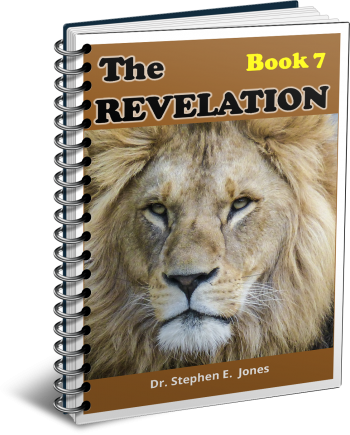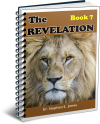Latest Posts
View the latest posts in an easy-to-read list format, with filtering options.

A study of Revelation 17-19. This is book 7 of an 8 part book series.
Category - Bible Commentaries

The fall of Babylon in Revelation 18 was a second fulfillment of the prophecy in Jeremiah 50 and 51. The first round of divine judgment came upon the original city of Babylon, while the second round is now coming upon Mystery Babylon. Though the scene has changed, the spirit of Jeremiah’s prophecy remains the same. Babylon today is a worldwide entity, so the prophecy encompasses a greater scope than it did with the original city.
Jeremiah 50 and 51 is a special book which the prophet apparently did not want to publish while Nebuchadnezzar was yet ruling. Most of the prophet’s focus up to the time of his letter was in urging the people of Judah and Jerusalem to submit to divine judgment and capitulate to the Babylonians, whom God had raised up as their captors. But in chapters 50 and 51 the prophet speaks of the fall of Babylon that was to occur after 70 years.
He speaks of nations coming from the north that would conquer Babylon (Jer. 50:41; 51:48). Among these nations would be the Medes (Jer. 51:11, 28). He does not mention the Persians by name, but refers to them only indirectly as “My war-club,” saying “with you I shatter nations” (Jer. 51:20). Such language referred to the constellation Perseus with his club by which he shattered, broke, or divided (peres) the nations. He is called “the breaker” in Micah 2:13, and peres is one of the words in the handwriting on the wall in Dan. 5:28, which the prophet identified with Persia.
Jeremiah intended his letter to be read by the king of the Medes and Persians at the time of Babylon’s fall. It might have been dangerous for him to prophecy of Babylon’s fall while the city was at its height of power. So instead of reading the prophecy to the people of Jerusalem, he sent it with Seraiah, the king’s quartermaster, who accompanied King Zedekiah and his delegation on an official mission to Babylon in 593 B.C. Jeremiah 51:59 says,
59 The message which Jeremiah the prophet commanded Seraiah the son of Neriah, the grandson of Mahseiah, when he went with Zedekiah the king of Judah to Babylon in the fourth year of his reign. (Now Seraiah was quartermaster.)
It was not unusual for vassal kings to visit their masters, and in this case, Zedekiah probably had to reassure Nebuchadnezzar that he would not revolt against him. The quartermaster's duty was to prepare the camp each night for the king and his guards. Zedekiah’s trip to Babylon is not recorded elsewhere, and it would have gone unnoticed except that Jeremiah had a special mission for Seraiah, the quartermaster.
Seraiah was the brother of Baruch, Jeremiah’s scribe, friend, and companion. Jeremiah entrusted this mission to a family member. Jer. 51:60-64 says,
60 So Jeremiah wrote in a single scroll all the calamity which would come upon Babylon, that is, all these words which have been written concerning Babylon. 61 Then Jeremiah said to Seraiah, “As soon as you come to Babylon, then see that you read all these words aloud, 62and say, ‘Thou, O Lord, hast promised concerning this place to cut it off so that there will be nothing dwelling in it, whether man or beast, but it will be a perpetual desolation.’ 63 And it will come about as soon as you finish reading this scroll, you will tie a stone to it and throw it into the middle of the Euphrates, and say, 64, ‘Just so shall Babylon sink down and not rise again, because of the calamity that I am going to bring upon her; and they will become exhausted’.” Thus far are the words of Jeremiah.
We see here that as soon as Seraiah arrived at Babylon, he was to read the scroll as a prophetic decree against the city and then cast it into the Euphrates. No doubt he first put it into a jar and sealed it so that the words would not be obliterated by the water. This was the place where the troops of Cyrus were destined to pass on the night that they took Babylon. When the river dried up, the troops walked along the dry (or muddy) river bed and no doubt stumbled across the jar containing Jeremiah’s prophecy about the fall of Babylon. I have no doubt that this letter was taken directly to General Gobryas who was leading the troops, and that he sent it to Cyrus and Darius, the kings from the east.
A stone was to be tied to the jar with the prophecy in order to weight it down and cause it to “sink down and not rise again,” depicting Babylon’s demise. So Jer. 51:42 says,
42 The sea has come up over Babylon; she has been engulfed with its tumultuous waves.
This did not take place literally with the old city, of course. The sea (Rev. 17:15) represents people—in this case, the waves of soldiers coming to engulf Babylon. So also in Rev. 18:21, we read,
21 And a strong angel took up a stone like a great millstone and threw it into the sea, saying, “Thus will Babylon, the great city, be thrown down with violence, and will not be found any longer.”
We see, then, that the stone which Seraiah was to tie to the jar became part of the prophecy itself, for it represented Babylon being cast into the sea and sinking to the bottom.
Jeremiah’s letter gives us another metaphor about Babylon in Jer. 51:25,
25 “Behold, I am against you, O destroying mountain, who destroy the whole earth,” declares the Lord, “and I will stretch out My hand against you, and roll you down from the crags and I will make you a burnt out mountain.”
So also the angel tells John in Rev. 18:8, “she will be burned up with fire.” The stone that Seraiah put into the jar is fulfilled as a mountain (kingdom), and by linking these two metaphors, we see that Babylon was to be cast into the sea like a burning mountain. Jer. 51:26 says that no one would be able to use this stone, or even part of it, as a corner stone or foundation. The Kingdom of God has Jesus Christ as its Foundation.
We read earlier in Rev. 18:2, “Fallen, fallen is Babylon the great!” This implies that the city falls twice, once in Daniel 5 and the other in our own time. However, we are also seeing the two collapses in short-term prophecy, where it is taking two “falls” to complete the destruction of Babylon. The first took place in September 2008 with the collapse of the banking system, followed by “The Great Recession.” There is yet another collapse soon to come as a double witness to the event in 2008, which, I believe, will complete the overthrow of Babylon at the hands of the kings from the east.
As we have already seen, the banking collapse of 2008 resulted in a tremendous slowdown in world trade. Ships sat idle in harbors everywhere as the Baltic Dry Index dropped to record lows. In other words, the collapse of Babylon in our time will affect merchants and corporations who rely upon world trade. So we read in Rev. 18:9-11,
9 And the kings of the earth who committed acts of immorality and lived sensuously with her [the harlot of Babylon] will weep and lament over her when they see the smoke of her burning, 10 standing at a distance because of the fear of her torment, saying, “Woe, woe, the great city, Babylon, the strong city! For in one hour your judgment has come.” 11 And the merchants of the earth weep and mourn over her, because no one buys their cargoes any more.
The angel then lists their “cargoes” in order of importance to the merchants:
12 cargoes of gold and silver and precious stones and pearls and fine linen and purple and silk and scarlet, and every kind of citron wood and every article of ivory and every article made from very costly wood and bronze and iron and marble, 13 and cinnamon and spice and incense and perfume and frankincense and wine and olive oil and fine flour and wheat and cattle and sheep, and cargoes of horses and chariots and slaves and human lives.
At the top of the list is “gold and silver,” and at the bottom are “slaves and human lives,” or human trafficking. The modern slave trade is less well known, because the traffickers themselves control the news media as well as the justice departments worldwide. Whenever news of this begins to be reported, the editors treat the reports as isolated cases so that the politicians and the superrich are not exposed. Yet these secret things will be unveiled at the time appointed.
Revelation 18:14 continues,
14 And the fruit you long for has gone from you, and all things that were luxurious and splendid have passed away from you and men will no longer find them.
The day will come when those who live in luxury will lose their mansions and palaces, along with their luxurious standard of living. In that day God Himself will redistribute wealth and land. The Kingdom of God begins with a distribution of land inheritance to each family, land which cannot be taken away by governments through taxation, nor can families even sell their land beyond the year of Jubilee.
Everyone will have the most basic form of wealth and the ability to support himself by a covenant with God, even as Joshua divided up the land among the tribes and families of Israel in Joshua 13-22.